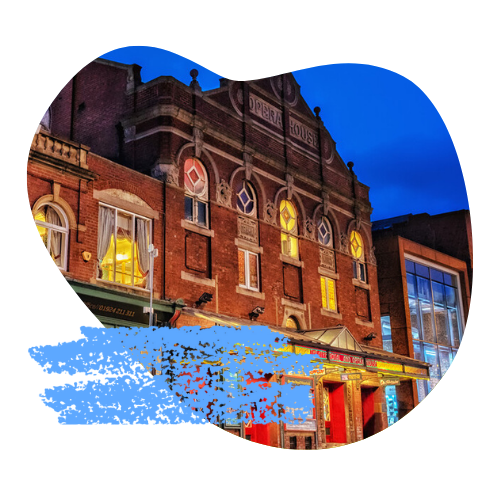CASE STUDY: FUNDRAISING
Transforming Membership Programmes with a Small Fundraising Team
How Theatre Royal Wakefield used personalised, automated communications and a deep understanding of customer behaviours to revitalise their membership programme.
West Yorkshire, England

Theatre Royal Wakefield
Producing & receiving theatre

SWITCHED FROM TICKETS.COM IN 2015
Challenge
A small fundraising team needed to rebuild an underperforming membership scheme, clarifying ownership and improving engagement to grow loyalty and income.
Solution
Using Spektrix tools for segmentation, personalisation, and automation, Theatre Royal Wakefield restructured their membership tiers and crafted tailored communications informed by clean, connected data.
Outcome
Smarter, data-driven fundraising delivered transformative results:
- Memberships increased from 99 to 439
- Income rose from £3,000 to nearly £19,000
- Retention reached 80–90%
- Members generated £144,479 in ticket sales

Theatre Royal Wakefield is a traditional Victorian theatre, home to a vibrant and varied programme of produced and touring work. Their year-round season includes shows for families, for fans of music, drama, comedy, and more.
At the 2025 UK Spektrix Hubs, Head of Development Sarah Shooter explained how her tiny, two-person team transformed their membership programme, making better use of segmentation, personalisation, and reporting tools in Spektrix to multiply revenue and increase loyalty.
Sarah’s worked in fundraising for over 30 years. She’s passionate about connecting people with the theatre and maximising income generation. At Theatre Royal Wakefield, she’s responsible for every aspect of philanthropic income - individual giving, corporate giving, trust and foundation applications, events, and of course fundraising membership programmes.
The theatre’s existing membership programme, Member+, faced significant challenges. Its placement within the organization was unclear, leading to a lack of ownership and direction.
Memberships weren't effectively serving either the theatre or its loyal audiences, and needed a significant overhaul to unlock their full potential to build fundraising and loyalty. So, Sarah and her team reimagined memberships, taking time out to comprehensively reassess the scheme and work out what they wanted from it.
- Build loyalty and support. The team knew how much their audience members valued the theatre, and wanted to respond to that positivity.
- Increase income generation. There was potential to grow revenue across the board, from the memberships, ticket sales, bar takings, and more.
- Sense of community. Even with a small team, the goal was to make every donor feel special with individual stewardship and the feeling of a close theatre family.
Based on their defined outcomes, Sarah and the team came up with a plan.
Segmentation and targeted communications
They created a five-tier membership programme, and then segmented thousands of potential members into more than twenty groups. Using booking and donation history, they crafted personalised messaging for every segment to introduce the scheme.
Database cleanup
In order to segment accurately and report on impact, the team first needed to clean up their database. This involved:
- Cleaning up old tags, keeping only those which were actively used
- Deleting old reports, focusing on useful, actionable data
- Setting up procedures to regularly audit the database
- Learning to make better use of autotags to reflect live data
“We took the time to personalise letters, and we really reaped the benefits. It took a long time to do, but in the first year we moved the membership fees from £3,000 to £8,000.”

Sarah Shooter
Head of Development
Through this process, the team spotted opportunities to make better use of Spektrix for fundraising. Using standard system reports and personal knowledge, they improved and added to their donor records to better understand which shows people attended and which benefits they used most regularly. As a team of just 1.5 people, efficiency was vital - with clean data, they could create automated, personalised communications to create a real sense of family and connection with minimal resource.
- Total members grew from 99 to 439 - an increase of 443%
- 80-90% member retention rate
- Membership income grew to almost £19,000
- Members bought almost £15,000 worth of tickets
Members bought £144,479 worth of tickets. That’s 8% of our overall ticket income for the year, and our members only make up 2.5% of bookers. That really shows the value our members are bringing to us. They’re really making a massive difference.

Wishing for a cleaner database?
Get in touch with Spektrix Client Success. We can walk you through a step-by-step plan to tune up your system in just an hour a week.
“We worked really, really hard to understand how we could surprise and delight those groups.
We taped welcome letters to people's chairs when they arrived, with an extra voucher for an ice cream. We used Spektrix to send out personalised emails highlighting other acts that we thought might be of interest to them.
And that's how we've achieved 80% member retention.”
To learn what mattered most to their members, the team launched a whole range of activities, trying to bring them into the theatre for reasons other than shows. Some of these offers were limited to higher tier members, helping them feel special and generating FOMO among lower levels - an approach that drove several members to upgrade.
Membership programme incentives:
- Behind-the-scenes tours
- Dress rehearsals
- Season launch events
Sarah quickly spotted that some members were signing up in order to access priority booking for a single, big-name act like comedian Jason Manford. They seldom came back for another show, let alone for the members-only invites.
While the membership programme attracted some of the theatre’s most frequent attendees, a small number of members didn’t buy tickets at all. Their motivations for supporting the theatre were different.
Some felt they were too old to attend, but still wanted to support the venue. Others were too busy, but called Sarah from time to time to make an additional donation. All of them are important. By combining personal knowledge of the audience with ticketing and donation data, the team could understand different motivations and design segments that included every potential supporter.
“It's really important in fundraising to track trends and understand what people want.
It’s ok that sometimes people don’t do what you expect them to do. That's all ok, as long as they're still giving me money, because I am a fundraiser after all.”

Promoting memberships - everywhere
The team added large, highly visible signage around the building to help members understand the vital work they were supporting. They showcased what goes on behind the scenes, in their participation work, and in the studio. At the request of members, they created simple merchandise - badges and pens - to recognise supporters. And in collaboration with marketing, they added a reminder about memberships to pre-show emails and ticket designs, which proved a great success.
Creating fundraising programmes in Spektrix
These improvements to Theatre Royal Wakefield’s fundraising membership programme were possible thanks to a small, dedicated team, and a connected CRM system that linked up donation history, ticket purchases, and external platforms like JustGiving.
Here’s Sarah’s step-by-step guide:
- Log personal information and donation history against customer records
- Pull in additional data from ticket sales and offline donations
- Use tags to consistently identify customer segments
- Use reports to track attendance by existing and potential members
- Surprise and delight them: Pop down to say hello, send out birthday treats, offer them an icecream, some sweets, or a glass of wine.
- Look for trends, know which shows members are attending
- Personalise and automate communications
- Keep exploring ideas - no matter how small your team, there’s something more you could achieve!
I've got all sorts of ideas. I'm really, really enthusiastic about what we can do. That ability to understand your audiences and use things that are at your fingertips has really, really helped what we're doing.




